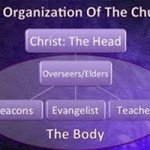Does the existence and recognition of elders indicate that they have positional authority?
This is the fourth post in my series on “Authority among the church.” In the “Introduction” post, I simply laid out the series of questions and issues that I plan to cover in this series. In the second post, I pointed out that Jesus responded negatively when asked about “positions of authority under his own authority.” In the third post, I answered the question, “How does someone lead without exercising authority,” by stating that among the church people lead from the influence of the life as an example to others, not by positional authority.
In Scripture, we see elders recognized/appointed among the church several times. Paul and Barnabas recognize/appoint elders when they were traveling back home on their first missionary journey (Acts 14:23). There were elders among the church in Ephesus when Paul was returning to Jerusalem for the last time (Acts 20:17). Paul included the overseers among those he addressed in his letter to the church in Philippi (Philippians 1:1). (Yes, I’m using the terms elders and overseers interchangeably.) Paul told both Timothy and Titus how to recognize who was qualified to be elders/overseers (1 Timothy 3:1-7 and Titus 1:5-9). Peter and James talked about the elders among the scattered churches that they addressed (1 Peter 5:1-3 and James 5:14).
Doesn’t the recognition/appointing of elders indicate that these people had positional authority among the church?
No. To put it simply, elders (and other leaders) are always addressed as being among the church, and never over the church. Thus, they are not positional separate from the church, but are mature people who live in a way that makes them an example to others.
Two of the passages involved are usually thought to indicate that elders (or leaders) have some type of positional authority: 1 Thessalonians 5: 12 and 1 Timothy 5:17.
We ask you, brothers, to respect those who labor among you and are over you in the Lord and admonish you… (1 Thessalonians 5:12 ESV)
Let the elders who rule well be considered worthy of double honor, especially those who labor in preaching and teaching. (1 Timothy 5:17 ESV)
The participial phrase “who are over” in 1 Thessalonians 5:12 and the participial phrase “who rule” in 1 Timothy 5:17 are actually from the same verb: proistemi. This verb can mean “be at the head of, rule, or direct” which would point to positional authority. However, the verb can also mean “be concerned about or care for.”
There’s a huge difference between “those who are over you” and “those who care for you.” But, if we look back at Jesus’ statement about the “greatest” and the “leaders” among the church (Luke 22:26), it seems that he disallows the the “be at the head of, rule, or direct” meaning of the verb proistemi. But, his statement perfectly falls in line with the meaning “be concerned about or care for.”
So, even these two passages (1 Thessalonians 5:12 and 1 Timothy 5:17) cannot be used to suggest that elders are “over” or “rule” the church without contradicting Jesus’ statement in the Gospels. Instead, if we understand the passages to point to those among the church who are caring for others, then they not only fall in line with Jesus statement, they also show how the elders (leaders) are those among the church who are doing a good job of caring for others.
Furthermore, if we look at the fuller context of the 1 Thessalonians passage, we see that elders are not functioning or working separately from the church, but along with everyone in the church:
We ask you, brothers, to respect those who labor among you and are over you [are concerned about you] in the Lord and admonish you, and to esteem them very highly in love because of their work. Be at peace among yourselves. And we urge you, brothers, admonish the idle, encourage the fainthearted, help the weak, be patient with them all. (1 Thessalonians 5:12-14 ESV)
In 1 Thessalonians 5:14, we see Paul urging the “brothers and sisters” toward admonishing, exhorting, and helping others, just as he said the “leaders” were doing. We respect those who are doing a good job of caring for and admonishing others, but we also recognize that caring, admonishing, etc. are the responsibility of all the brothers and sisters.
In each case, we see that elders/leaders are not over or separated from the church and given positions of authority. Instead, they are those among the church who are doing the things that all believers should be doing. And, in doing what all believer should be doing, they become good examples for others to follow.
———————————————-
“Authority Among the Church” Series
- Authority among the church? Starting a new series.
- What did Jesus say about positions of authority under his own authority?
- In the church, how does someone lead without exercising authority?
- Does the existence and recognition of elders indicate that they have positional authority?
- Does shepherding and overseeing suggest exercising authority?
Addendum: The most pervasive argument against positional authority among the church
In the church, how does someone lead without exercising authority?
This is the third post in my series on “Authority among the church.” In the “Introduction” post, I simply laid out the series of questions and issues that I plan to cover in this series. In the second post, I pointed out that Jesus responded negatively when asked about “positions of authority under his own authority.”
But, in the world today, it is assumed that leaders will be placed in positions of authority. We read about leaders among the church in Scripture (Luke 22:26, 1 Thessalonians 5:12, 1 Timothy 5:17, Hebrews 13:7, Hebrews 13:17), so how are they supposed to lead without being in positions of authority?
(Some of the information in the post is taken from The Authority of Church Elders in the New Testament by Matthew McDill, available online at that link.)
In the New Testament, “leaders” are never given positional authority over others in the church. The verbal forms of “authority” are used several times in relation to the church in the New Testament, but the verbs are always used in the negative: i.e., do not exercise authority. (For example, see Matthew 20:25-26, Mark 10:42-43, Luke 22:25-26, 1 Peter 5:3.) They are never given “government or control, in the sense of the authority to make decisions for the church.”
So, how are these people supposed to “lead”? They are to lead by the influence that they possess among the other people who are part of the church. This influence is “based on respect that is earned in accordance with the character, skill, and knowledge.”
Two passages in particular highlight this kind of leading by influence because of their spiritual maturity. First, consider Hebrews 13:7:
Remember your leaders, those who spoke to you the word of God. Consider the outcome of their way of life, and imitate their faith. (Hebrews 13:7 ESV)
Notice what is important about “remembering” these leaders (who are describing as having spoke to them regarding the word of God): 1) the result of their manner of life, and 2) their faith. These are the things that are to be imitated. Thus, the recipients of this letter are being encouraged to follow the example of life set by these leaders.
Next, consider 1 Peter 5:3 (in which Peter directly addresses “elders”):
So I exhort the elders among you, as a fellow elder and a witness of the sufferings of Christ, as well as a partaker in the glory that is going to be revealed: shepherd the flock of God that is among you, exercising oversight, not under compulsion, but willingly, as God would have you; not for shameful gain, but eagerly; not domineering [exercising authority] over those in your charge, but being examples to the flock. (1 Peter 5:1-3 ESV) – verse 3 is highlighted
Notice the 3 contrasting descriptions of who Peter expects these people to “shepherd the flock of God… exercising oversight”: 1) Not under compulsion, but willingly, 2) not for financial gain, but eagerly, and 3) not by exercising authority, but by being examples.
Now, some have suggested that the term translated “domineering” is stronger than “exercising authority.” Even if it is, Peter does not say, “Not by domineering, but by exercising authority properly.” Instead, he says, “Not by domineering, but by being examples.” This is an important contrast that tells us how Peter expected elders to act among others. They are supposed to lead by the influence of their life as examples among others in the church.
This type of leading (by influence/example instead of by authority) explains why others are exhorted to “submit themselves” to those leaders. (For example, see Hebrews 13:17.) This kind of submission is offered to those who live in a manner that is worthy of submission. This is not subservience that is given because a person holds a position of authority.
So, in Scripture, leaders among the church do not lead by exercising authority or by making decision for the church. Instead, they lead through the influence of their life, which must be a good example to the church – an example of serving others, loving others, being concerned for others, teaching, humbling themselves, considering others as more important, proclaiming the gospel, living in harmony with others, sharing their possessions with others, and trusting God (among other things).
———————————————-
“Authority Among the Church” Series
- Authority among the church? Starting a new series.
- What did Jesus say about positions of authority under his own authority?
- In the church, how does someone lead without exercising authority?
- Does the existence and recognition of elders indicate that they have positional authority?
- Does shepherding and overseeing suggest exercising authority?
Addendum: The most pervasive argument against positional authority among the church
What did Jesus say about positions of authority under his own authority?
This is the second post in my series on “Authority among the church.” In the “Introduction” post, I simply laid out the series of questions and issues that I plan to cover in this series.
To begin with, when talking about authority, no Christians desire to usurp Jesus’ authority. From those who believe that there is no kind of authority among the church to those who believe that there is one person who wields authority over everyone in the church alive today, all believe that Jesus remains the head of his church.
Thus, the question is not: Is Jesus the head of the church and does he have authority over his church? Instead, the question is this: Does Jesus allow others to have positions of authority under his own authority?
In Scripture, there is an example of two people coming to Jesus and asking for positions of authority. Actually, in Matthew’s account, their mother asked Jesus on their behalf, but Mark makes it clear that the request belonged to James and John. The story is told in Matthew 20:20-21 and Mark 10:35-37.
James and John (through their mother) came to Jesus with this request: “When you come into your kingdom (glory), allow us to sit at your right hand and your left hand.” They were admitting that Jesus was the supreme authority of the kingdom. They were asking for positions of authority under Jesus’ own authority. (Luke cuts out the part about James and John, but tells us that the request was about having a high position within Jesus’ kingdom – i.e., who would be the greatest.)
This is how Jesus responded (with only slight variation in each account):
And he said to them, “The kings of the Gentiles exercise lordship over them, and those in authority over them are called benefactors. But not so with you. Rather, let the greatest among you become as the youngest, and the leader as one who serves. For who is the greater, one who reclines at table or one who serves? Is it not the one who reclines at table? But I am among you as the one who serves.”
Jesus tells them that leaders among the nations (“Gentiles”) “exercise lordship” and “exercise authority” over others. But, he also says that it should be different “among you,” that is, among his followers. (In Matthew’s and Mark’s version, Jesus adamantly states, “It shall not be so among you.” – Matthew 20:26 and Mark 10:43) Among the church, Jesus says, things are reversed. The leaders are now those who humble themselves as the youngest and those who serves others.
In order to drive his point home, Jesus tells a short parable. He asks them to consider a dinner party. Who is the greater, the one who sits at the table or the one who serves food? Obviously, from a natural and culture perspective, the one who sits at the table is greater than the one who serves the food.
But, Jesus remind them, he came as one who serves others. Thus, Jesus is using is own life of service to others as a lesson for them. If he – the Lord of the kingdom – is a servant, then obviously in his kingdom the one serving is greater than the one reclining at the table.
At the dinner part, the person sitting at the table is in a position of authority over the one serving the food. Yet, to Jesus, the one serving is the leader, and he pointed his following toward being like the one who served. Even though the world might think the one seated at the table was greater, the church should think otherwise.
So, what was Jesus’ answer to a request for positions of authority? In his kingdom, the leaders are not those who seek or who are in positions of authority. The leaders are those who serve others.
———————————————-
“Authority Among the Church” Series
- Authority among the church? Starting a new series.
- What did Jesus say about positions of authority under his own authority?
- In the church, how does someone lead without exercising authority?
- Does the existence and recognition of elders indicate that they have positional authority?
- Does shepherding and overseeing suggest exercising authority?
Addendum: The most pervasive argument against positional authority among the church
Authority among the church? Starting a new series.
I started writing this series on authority among the church several weeks ago, and, almost immediately, I began putting off publishing? Why? Because I honestly didn’t want to publish another blog post, much less another series, on the topic of authority.
Unfortunately, whenever I write about the church gathering together, authority pops up. Whenever I write about the Lord’s Supper, the topic of authority is raised. When I write about spiritual gifts, someone brings up authority. When I write about missional living and gathering new believers, authority is brought up.
Authority among the church is a topic that touches every aspect of our understanding of the church. And, if we don’t talk about it, it quickly becomes the “elephant in the room.” It may not be the elephant in the room that no one talks about. Instead, it’s the aspect of the church that everyone assumes and affects everything that it means to be and act as the church as as God’s children.
In the next post, I’m going to examine a passage of Scripture in which two people ask Jesus for a position of authority under his own authority. That’s right, they did not want to usurp Jesus’ authority. Instead, they wanted to exercise authority under Jesus’ authority. I think Jesus’ response is very important to this discussion.
In the third post, given Jesus’ response to authority in the previous post, I’m going to ask the question, “How does someone lead without exercising authority?” In this post, I hope to make a very important distinction between authority and influence.
In the fourth post, I want to answer another question: “Doesn’t the existence of elders indicate that they have some kind of authority?” In Scripture, it’s clear that there were elders among those early churches, and it’s clear that everyone believer was not considered an elder. Does this distinction indicate some type of authority?
In the final post – unless I change my mind – I’m going to look at the relationship between shepherding and overseeing and exercising authority. Elders were instructed to shepherd and to oversee the church. Again, doesn’t this indicate some kind of authority?
I’m assuming that some of my readers will disagree with me. That’s fine. I only ask that you consider what I write, and deal with my arguments. I’m willing to learn from my readers, but I’m also hoping that you would be willing to learn as well.
Finally, this topic needs more discussion… much, much more. So, please feel free to add your own thoughts to these posts.
———————————————-
“Authority Among the Church” Series
- Authority among the church? Starting a new series.
- What did Jesus say about positions of authority under his own authority?
- In the church, how does someone lead without exercising authority?
- Does the existence and recognition of elders indicate that they have positional authority?
- Does shepherding and overseeing suggest exercising authority?
Addendum: The most pervasive argument against positional authority among the church
Replay: Titles for Christians in Scripture
Four years ago, I wrote a post called “Titles Revisited.” In the post, I look at vocative nouns to see what titles are used in Scripture. Vocative nouns are nouns of direct address, that is, nouns used to refer to someone when speaking to that person. (I explain it with examples in the post.)
———————————–
I’ve previously discussed the use of titles between believers in a couple of posts (see “Dr. Anabaptist” and “Do titles matter?“). I thought it might be interesting to see what “titles” are used in Scripture. Specifically, I looked at vocative nouns… that is, nouns of direct address.
As an introduction, in the sentence, “My brother bought me a car”, the word “brother” is a noun being used as the subject of the sentence. But, in the sentence, “Brother, buy me a car”, the word “brother” is still a noun, but here it is used as a vocative. The person speaking is directly addressing someone by the designator “brother”. The subject of the second sentence is the implied “you” of the imperative verb “buy”.
So, I am looking at Scriptural uses of vocative nouns as they are used to address believers and others. What “titles” or “designators” did the biblical authors use to address their readers and other people?
Many times, a person is addressed by their name in the vocative case. For example, Theophilus, Ananias, Saul/Paul, Cornelius, Peter, Felix, King Agrippa, and Festus are all addressed by name in the book of Acts.
Sometimes, an author would address his readers by referring to their location: people of Jerusalem, Corinthians, Galatians, and Philippians. In each case, the person speaking or writing is addressing people from that location, and, in most instances, believers living in that location. (Thus, Aquila and Priscilla would be included in an address to “Ephesians” while they were living in Ephesus, but an address to “Romans” would include Aquila and Priscilla after they moved back to Rome.)
In another type of vocative address, the author would refer to his readers by designating them according to character traits. Thus, James referred to some of his readers as “Adulteresses”. Similarly, John referred to his readers based on either their age or their spiritual maturity: “Children”, “Young People”, “Older People”. Another favorite character trait used in an address is “beloved”. In fact, it is used 30 times in the New Testament. This makes it one of the most used “titles”.
But, what about the title “brother” (or “sister”). How often was this “title” used in the New Testament? Well, of the 640 nouns in the vocative case in the New Testament, 112 of those refer to others as “brothers” or “sisters”.
For the record, “brother” (or “sister”) is not the vocative noun with the most occurrences in the New Testament. That would be the noun “Lord”, which is used 124 times, primarily to refer to Jesus Christ.
It seems that, at least for the biblical authors, they preferred to think of and refer to other believers as “brothers” or “sisters”. I don’t think this is an accident. Instead, I believe that the idea of being adopted into the family of God was very important to the early believers. They recognized that when they were indwelled by the Holy Spirit, all of their relationships had changed. They took these words of Jesus very seriously:
While he was still speaking to the people, behold, his mother and his brothers stood outside, asking to speak to him. But he replied to the man who told him, “Who is my mother, and who are my brothers?” And stretching out his hand toward his disciples, he said, “Here are my mother and my brothers! For whoever does the will of my Father in heaven is my brother and sister and mother.” (Matthew 12:46-50 ESV)
As we follow Christ and as the Spirit transforms us, we stop treating one another like the world treats people (based on rank, popularity, wealth, power, education, abilities, etc.). Instead, we begin to treat one another like the family that we are. We are members of a new family – not a temporary, earthly family of flesh and blood, but an eternal family birthed by the Spirit.
Thus, “brother” and “sister” are not niceties to use to address other believers, but a reminder of our intimate relationship with one another in God by Jesus Christ and through the Spirit. We should not be embarrassed if someone calls us “brother” or “sister”. We should not be embarrassed to call other people “brother or “sister”. Why? Because it is less a “title” and more a reminder of who we are together because of God’s grace and power.
Who is your spiritual covering?
Recently, someone (and I don’t remember who) asked me if I had ever written anything about the concept of church leaders (especially the senior/head pastor) being a “spiritual covering”. (If you asked me that, let me know, so I can give credit where it is due.)
My answer was that I had not written about that topic, but perhaps I should. But, where should I start?
This is a huge question, and it reaches down into the depths of our understanding of God, Jesus Christ, the Holy Spirit, and the church. For example, in the way that I understand God and the church, the concept of a “spiritual covering” doesn’t make sense. So, when I read Scripture, it’s hard for me to see any suggestions that one person acts as a “spiritual covering” for another person.
So, I’m throwing this question out to you. Whether you agree with the concept of a “spiritual covering” or not, what arguments or Scripture have you heard/seen to support a “spiritual covering”?
How do you view leadership among the church?
I occasionally write about leadership among the church. While I usually write about other topics, for some reason the leadership posts seem to garner the most attention. Why? Well, because among believers today, much of church life is centered around those who we recognize as our leaders.
If you’ve read any of my posts about leaders among the church, then you know that I don’t hold to modern concepts of leadership in the context of the church, not even to the concept of “servant-leader.” Why? Because I think Jesus redefined what it means to lead among the church.
Keith at “subversive1” seems to have a similar understanding according to his post “This is What Leadership Looks Like According to Jesus.”
The post consists of 4 pictures: 2 pictures that Keith describes as “leadership according to Jesus” and 2 pictures that Keith says represent leadership among the church today, but that is not leading according to Jesus.
I’d love to hear your thoughts on Keith’s post (pictures).
Jeremy’s thoughts on “leaving the pastorate”
“Leaving the pastorate” is a huge concern at the seminary. The are speeches and sermons and emails and meetings each year designed to help students remain “in the pastorate” for the long haul.
Jeremy at “Till He Comes” presents a different view in his post “Leaving the Pastorate.”
First, Jeremy recalls his experience in his first “pastorate,” and the events that led to him losing his job. He makes a strange (“strange” to the traditional church at least) statement concerning his desire to find another pastorate:
Looking back, I regret that decision. I wish I had stayed. I wish I had pastored without pay.
I would have learned so much working in the community, among the people I wanted to love and serve. I would have lost my fear of losing the big tither in church. I would have gained freedom to teach the Scriptures clearly. I would have gained the liberty to lead the people into the community. I don’t know what would have happened, but looking back now, it is what I wish I had done.
From this point, Jeremy explains what happened next, and how he came to a point where he did finally “leave the pastorate”… and he considers this a good thing. Apparently, this post is the first in a series, so I’m looking forward to reading more of Jeremy’s thoughts about this.
What do you think?
Pastor / Church Codependency
Chris at “The Amplified Life” (Isn’t that a great blog title?) has written a very good article called “Neil Cole on Dysfunctional Leadership.”
He quotes from Cole’s book Organic Leadership, and the quote is very good.
But, I also appreciate Chris’ comments on the quote. Chris writes:
According to Cole leaders have enabled this and now we wonder how we got here. We can blame the culture, and many leaders often do because that’s the easy thing to do, but according to this assessment the fault lies with how church leaders have been leading the church. We have fostered a codependent relationship and we struggle to break free from what we have fostered. I think this may account for what I brought up in another post about the role of the pastor today. Pastors have essentially taken on roles that were meant for other Christians but our codependent leadership dynamic has allowed this to happen, then we wonder why thousands of pastors leave the ministry each year.
I agree. There is a codependence problem between many churches and church leaders today. Interestingly, believers do need one another, and they should be able to rely on one another, but this is not what Chris (and Neil Cole) are talking about.
I think it will take both church leaders and churches working together to break this cycle of codependence. The problem is, I’m not sure many want to break their codependent relationship, because they think it’s perfectly fine and even scriptural.
What do you think? What will it take for churches and pastors/leaders to break the codependency that Chris wrote about? Should they?
Arthur and Bob
Arthur at “The Voice of One Crying Out in Suburbia” has a problem. You see, in his latest post “Be Like Bob,” Arthur describes a church leader named Bob who helps a church begin serve God and serve others for themselves.
According to Arthur, the church begins to take part in living the gospel (that’s what it is, by the way), that soon Bob doesn’t do everything anymore, and he can work and support his family and others without needing monetary support from the church.
So, what is Arthur’s problem? He wants to follow a guy like Bob, but he doesn’t find many “Bob’s” in the church today. (By the way, I like following people like Bob.)
Here is how Arthur describes Bob and his work among the church:
After a year or two [of Bob equipping and training others to serve], perhaps 4 or 5 of the men of the church have advanced in maturity and are regularly ministering to the needs of the believers in this local church. The church recognizes these men as elders and they begin to shoulder an increasing load of the ministry in the church, again both to “members†and to the community in addition to their secular jobs. As the newly recognized elders help to minister and equip in the local congregation, Bob has more time freed up and is able to work his regular job on a full-time basis. Bob no longer accepts a regular salary from the church. The $400 the church had been paying Bob while he was laboring in ministering and equipping is now freed up so the local church decides to donate all of this to local and global ministries engaged in spreading the Gospel and works of mercy. Bob spends more time at his “regular†job and thus more time among unbelievers than in his office at the church.
Read Arthur’s post… compare it to what you find in Scripture. (I can find Bob in Scripture.) Compare it to what you find in the church today.
Where are all the Bob’s?










